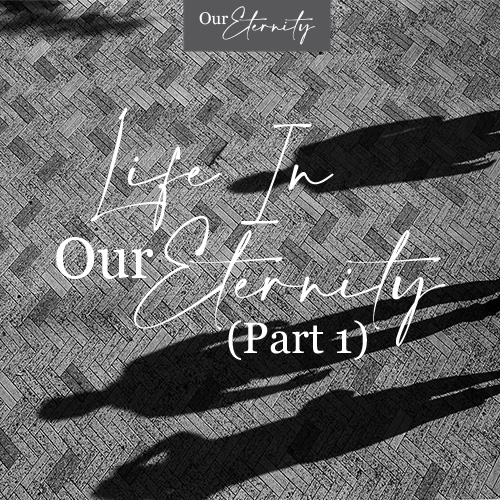Life in Our Eternity {Part 1}

Have you ever observed that the Bible starts in a garden—Eden—and ends in a garden-city—New Jerusalem—both of which are places where God dwells with mankind?
The Bible begins in Genesis with a very good creation. Adam and Eve dwelled in the garden of Eden with God. God gave them everything good: close communion with Himself, a relationship together to reflect Him, and the ability to respond to God’s good commands with obedience. With all of this, they chose to disobey Him. We are made for communion with God, to reflect God in relationships with each other, and for responding to God’s goodness and glory with obedience. But disobedience is what mankind knowingly chose, and so we experienced spiritual death—the fall.
This is the continuing pattern of the Old Testament too—no one is able to correct the Adam problem. We are all born in Adam; no one is able to not sin—to, of their own accord, choose to follow God over themselves. Jesus Christ, fully God and fully man, however, changes that. He is able to be perfectly obedient—experiencing perfect communion with the Father. He is the second Adam in whom we can be born again and made alive through repenting of our disobedience and placing our faith in Him as our faultless Representative. We now await the return of Christ when God will again dwell with man on the new earth in the garden-city of New Jerusalem (Revelation 21-22; Isaiah 65:17-25).
To learn about what we will do on the new earth—what life will be like there—we can actually look back to that first garden, Eden. Prior to mankind’s disobedience and fall, Adam and Eve’s life is blessed in a place considered by God to be very good (Genesis 1-2). Their lives there, prior to sin, gives us at least three clues about the goodness to be anticipated in our future existence. These clues come from the capacities God gave mankind to reflect Him as those made in His image: our cultural capacity, our relational capacity, and our moral capacity. From the outworking of these capacities, mankind fills and subdues the earth (Genesis 1:28).
Clue 1 – Our Cultural Capacity: Tending, Governing, and Composing
God created mankind to cultivate His Edenic sanctuary (Genesis 2:5b). From this word, “cultivate,” comes the word and concept, “culture.” When farmers cultivate, or till, the soil, they bring from the ground a harvest of food. They work the earth to bring, from soil and seed, something good to eat. So, when mankind makes culture in various forms unto the Lord, we work what God has given to make something good for our lives to reflect Him who is Creator.
Tending
God made man to cultivate and keep His glorious garden. So, tending, or keeping, is one outworking of the command to fill and subdue the earth:
Then the Lord God took the man and put him into the garden of Eden to cultivate it and keep it. (Genesis 2:15)
Governing
In Genesis 2:19, God brought each animal to Adam so that he would name the animals, another outworking of the command to fill and subdue the earth:
Out of the ground the Lord God formed every beast of the field and every bird of the sky, and brought them to the man to see what he would call them; and whatever the man called a living creature, that was its name.
Composing
Then, in Genesis 2:23, when woman was made, Adam composed a short poem rejoicing in Eve:
The man said, “This is now bone of my bones,
And flesh of my flesh; she shall be called Woman,
Because she was taken out of Man.”
So, mankind tended the home garden; mankind exercised dominion and governance—not to mention creativity—to name each animal; mankind exercised rational, emotional, and creative capabilities to compose a poem. And now, all around us, we see further evidences of these capabilities. Mankind sets and executes systems of government; mankind makes all (known) aspects of God’s creation subjects of our study (and we continue to name our findings); mankind fills the earth with music, writings, paintings and more; mankind tends our homes and landscapes. God designed for all of this to happen—for us to fill and subdue the earth with activities flowing from our cultural capacity.
Yet, our work after Adam’s disobedience takes a significant downgrade. We are no longer cultivating and keeping God’s garden as the place where He dwells. After mankind sins, we are expelled from God’s presence and the earth is no longer His sanctuary. We no longer naturally remember that we were made to do everything as unto Him and as a reflection of Him. So this present earth is only a shadow. One day, we will be restored to again tend and cultivate the sanctuary where He dwells.
Clue 2 – Our Relational Capacity
In Genesis 2, we see another clue about our eternal state—the relational clue. Adam’s poem about Eve reveals our hearts’ capacities for each other. Relationships are good, are meant to be a joy to us, and are given as a reflection of God. For an initial understanding of why we grieve the losses of our children so deeply, we need go no farther than the beginning of the Bible in Genesis where we see the depth of the first relationship between two human people. While Adam’s poem direct reflects the unique relationship of marriage, indirectly, it is evidence of the intrinsic relational capacity God gave to us. Human relationships are deeply felt because we were created by God to experience them. To feel our losses deeply and to grieve them thoroughly are because we have this God-given relational capacity.
Mankind’s relationships after Adam’s disobedience take a significant downgrade from what God created. We are no longer directly enjoying our relational fellowship on earth in the context of dwelling with God. Since His dwelling place is not with us on earth, we don’t have the honor of reflecting Him with each other in the context of His manifest presence. After the fall, we no longer naturally remember Him as the basis for our relationships, which introduces into them varying degrees of brokenness or distance. When Adam sinned, the ultimate relational distance was introduced in the human experience—death. Yet, this present earth is not all there is of relationships. One day, we believers will be restored to again know each other—know our Hope Babies—in a place free from any brokenness or distance. We will enjoy redeemed and restored relationships in His manifest presence.
This article will continue on Thursday.
- Lianna
Hope Mom to Noelle
Lianna (@liannadavis) is wed to Tyler and mom of two dear daughters. She is author of Made for a Different Land: Eternal Hope for Baby Loss (Hope Mommies, 2019). More of her writing can be found at her website.
We would be honored to share your story as a Hope Mom on our blog. On Saturdays we feature Hope Moms’ stories in order to showcase God’s faithfulness even in the midst of such deep sorrow. If you would like to have your story shared on our blog for this purpose, learn more and submit here.


Got something to say?